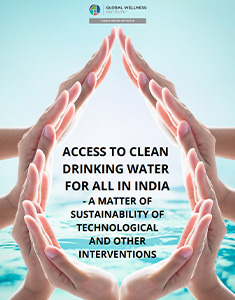Access to Clean Drinking Water for All in India
A Matter of Sustainability of Technological and Other Interventions
Clean Water Initiative Whitepaper
Close to 0.3 million children under the age of five (U5) die every year in India due to infectious diarrhea caused by drinking water contaminated with fecal pathogens and living in poor sanitation and hygiene (WASH) conditions. Technological and other interventions by the public and private sectors to tackle the WASH challenge have achieved commendable success over the last decade. Yet, half of India’s population still does not have access to safely managed drinking water, and around the same number continues to defecate in the open. Improvement in the health outcomes, including a reduction in diarrheal deaths among U5 children, has not been dramatic either. Fresh design thinking is seen as necessary to ensure the sustainability of efforts. Providing access to safe drinking water and a WASH environment is no doubt complex, with multi-sectoral challenges. But, without securing these, there can be no sustainable development. Public health systems that are not built on the foundations of primordial prevention will continue to remain fragile. DOI: 10.5281/zenodo.5506475

























































